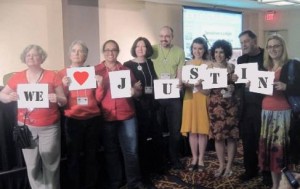Reposted from the first Butterflies and Wheels.
Second wave feminism has always had a radical strand. It has always been about more than equal pay. It was also, for instance, about exposing and then discarding banal conventional unreflective ideas that led to banal conventional unreflective behaviour. Ideas about cooking and cleaning being somehow naturally women’s work, for example, which led to men cheerfully lounging about while women put in what Arlie Hochschild calls a second shift. And even more than that, unexamined ideas about what women are like, what they want, what they should be and do. David Lodge once remarked that women became much more interesting after feminism, and his own novels bear this out, as do those of Michael Frayn and other male novelists who started writing in the ’50s or ’60s. The pre-1970 female characters are non-entities, the post-1970 ones – Robyn Penrose in Nice Work, Kate in Headlong – take up a lot of space. The very way women are perceived and noticed and thought about changed with feminism, and that would not have happened if mere institutional reform had been the only goal.
But there are radical ideas and then there are radical ideas. One of the less helpful ones was difference feminism. The foundations of this shaky edifice were laid in the ’70s, when a popular rhetorical move was to label many usually well-thought-of attributes and tools–reason, logic, science, “linear” thinking, abstract ideas, analysis, objectivity, argument–as male, and dub their opposite female. So by a contortion that defies “male” logic, it somehow became feminist to confine women all over again to intuition, guesswork, instinct, feelings, subjectivity, and arm-waving.
This school of thought became mainstream in 1982 with the publication of Carol Gilligan’s highly influential In a Different Voice. Gilligan claims that women have their own special version of morality rooted in relationships and caring rather than abstract notions of justice and equity. This of course sounds startlingly like the patronizing pat on the head with which women were barred from public life in the 19th century, because the dear creatures were simply too good for that mucky arena. It is quite a feat of legerdemain to take what had been thought a classic bit of sexist mystification and turn it into new feminist wisdom.
But however perverse or odd it may seem, and though her research has been sharply criticised,[1] Gilligan’s views were and are indeed popular. The criticisms were in small academic publications, while Gilligan got an admiring profile in the New York Times Magazine in 1990, complete with cover picture. In the wake of In a Different Voice came epigones such as Nell Noddings’ Caring, Sara Ruddick’s Maternal Thinking, and Belenky, Clinchy, Goldberger and Tarule’s Women’s Ways of Knowing. The last-named book, based on interviews with 135 women, claims that women are uncomfortable with argument and disagreement, and that they have a different approach to knowledge that emphasizes collaboration, consensus, mutual understanding. Women’s Ways of Knowing declares in the final paragraph, “We have argued in this book that educators can help women develop their own authentic voices if they emphasize connection over separation, understanding and acceptance over assessment, and collaboration over debate…if instead of imposing their own expectations and arbitrary requirements, they encourage students to evolve their own patterns of work based on the problems they are pursuing.” What a flawless recipe for infantilization and mental abdication. If it were in a book dated 1886 we would all point and laugh, but tragically it is dated a century later.
Women’s Ways of Knowing raises questions about the evidence its findings are based on, and about what to do with those findings. Critics have duly pointed out that the interview subjects were told in advance that the topic was women’s different approaches to knowledge, which is not quite the way to elicit uncontaminated testimony. But even apart from that, even if their findings were really findings rather than self-confirmed prophecies, there would still be a problem with the conclusions the authors draw. If the evidence truly supported their idea that women prefer to maintain “connectedness”, make everyone feel good, and promote understanding and acceptance over judgment or assessment, then clearly the response ought to be loud and urgent demands for remedial education for women starting yesterday. In morality, ethics, social life, friendship, there is something (though far from everything) to be said for preferring understanding and acceptance to judgment and assessment, but in epistemology or “ways of knowing” there is just about nothing. Critical thinking is widely recognised to be a basic tool for cognitive work, and surely the whole point of critical thinking is to know what not to accept, to know how to judge and assess. It is all about rejection, separation, negation, being “judgmental”; tolerance and love and sympathy and sensitivity are the wrong tools for the job. A favourite move for the different ways of knowing crowd is to quote an aphorism of Audre Lord’s, “the Master’s tools will never dismantle the Master’s house”, which fact perhaps demonstrates the result of eschewing logic. Why on earth would the Master’s tools not dismantle his house? If he goes to town or gets drunk and falls asleep in the corn crib, his tools will work very nicely. But in any case feminists need to resist any rhetorical move to hand those tools over to the Master, that is, to claim that logic and reason and evidence and “linear thinking” and judgment belong to men, and women should claim what’s left over. Carl Sagan used to like to say, echoing Hume, that extraordinary claims require extraordinary evidence, and we should demand very very good evidence indeed (better than 135 women summoned to describe their different way with knowledge) before accepting the notion that logic is male.
And the evidence is not particularly good, to put it mildly. The notorious 1990 American Association of University Women study of the putative fall in self-esteem of adolescent girls was assailed from all sides for its flawed methodology, but it got a flood of media attention all the same. It inspired more studies and books such as Peggy Ornstein’s Schoolgirls and Mary Pipher’s best-selling Reviving Ophelia, and wasted the time of countless girls in “self-esteem” classes when they might have been learning history or math. Bizarre claims resting on flawed evidence generated even more bizarre claims resting on yet more flawed evidence, in a spiral of epistemological breakdown. If only everyone had done less accepting and more judging. Susan Haack sums the matter up:
“But even if there were such a thing, the case for feminist epistemology would require further argument to show that women’s ‘ways of knowing’ (scare quotes because the term is tendentious, since ‘knows’ is a success-word) represent better procedures of inquiry or subtler standards of justification than the male…[W]hat my experience rather suggests is that the questions of the epistemological tradition are hard, very hard, for anyone, of whatever sex (or gender), to answer or even significantly to clarify.”[2]
We have certainly gone to a great deal of trouble in order to come back to where we started. Women are sweet, women are soft-headed, women are nicer than men and don’t like all that pesky judgmental science and logic and reason and argument and disagreement. If this were true it ought to be changed, but there is little reason to think it is true. We thought we had escaped the tyranny of low expectations for women, we thought we had crashed that prison and freed ourselves to be as tough and hard-headed and autonomous and wide-ranging as men–and now here come the beaming Ed School professors to tell us No, no, that’s all wrong, that’s the male way of doing things. We are women and we have to park our brains at the door and be nice and warm and caring and empathic and fuzzy. That’s the sort of thing that makes a self-respecting feminist want to be as opinionated and cold and uncompromising and downright ruthless as she can find it in her to be. Janet Radcliffe Richards puts it this way:
“It is hard to imagine anything better calculated to delight the soul of patriarchal man than the sight of women’s most vociferous leaders taking an approach to feminism that continues so much of his own work: luring women off into a special area of their own where they will remain screened from the detailed study of philosophy and science to which he always said they were unsuited, teaching them indignation instead of argument, fantasy and metaphor instead of science, and doing all this by continuing his very own technique of persuading women that their true interests lie elsewhere than in the areas colonized by men.”[3]
Feminists need to keep their eyes on the prize, as the saying goes, and resist with every fibre of their being attempts to persuade them that the most fascinating, inspiring, exhilarating, productive, truth-generating fields of intellectual endeavour are the private property of men and that authentic women are too maternal and caring and touchy-feely to be good at them. A more perverse, backward-looking, destructive idea is hard to imagine, and the fact that it comes from friends rather than enemies is one of the surrealistic jokes of modern life.
Footnotes 1 Colby, Anne & William Damon. “Listening to a Different Voice: A Review of Gilligan’s In a Different Voice.” Merrill-Palmer Quarterly 29, 4 (October 1983). Walker, Lawrence J. “Sex Differences in the Development of Moral Reasoning: A Critical Review.” Child Development 55 (1984).
2 Haack, Susan. Manifesto of a Passionate Moderate The University of Chicago Press (1998).
3 Radcliffe Richards, Janet. “Why Feminist Epistemology Isn’t”. The Flight From Science and Reason ed. Paul Gross, Norman Levitt, Martin Lewis, New York Academy of Sciences (1997).
(This is a syndicated post. Read the original at FreeThoughtBlogs.)




